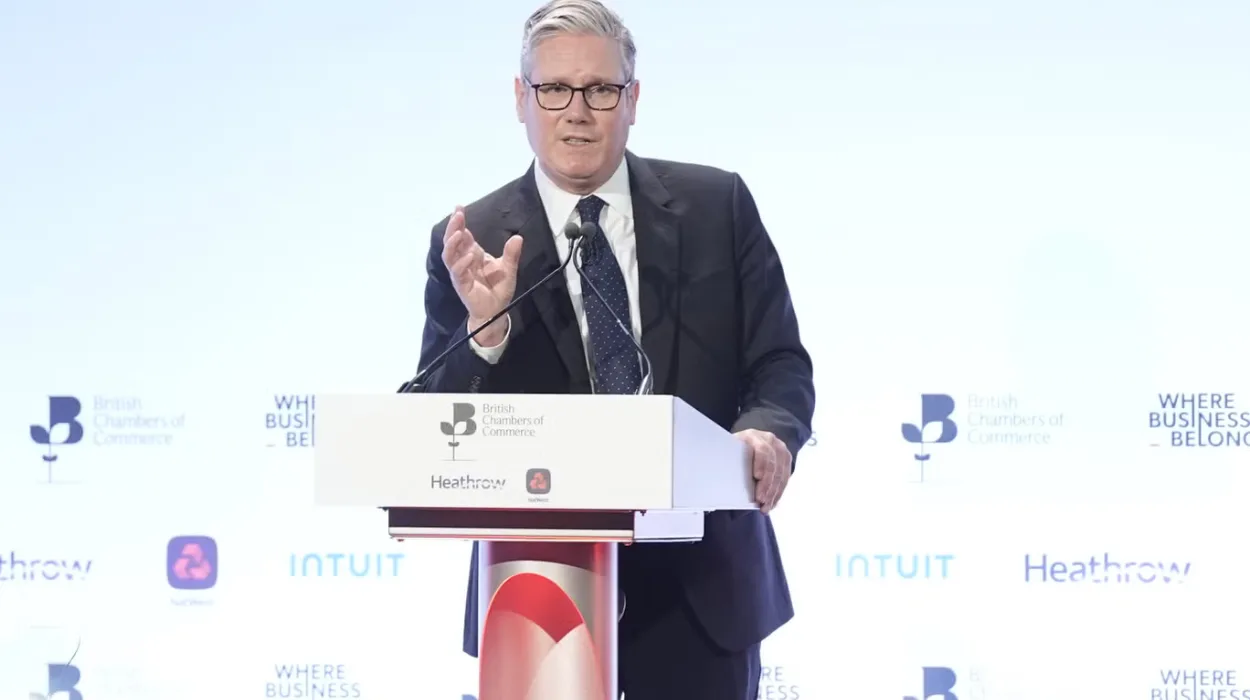UK (Parliament Politics Magazine) – UK PM Keir Starmer admitted Labour’s national insurance hikes burdened firms but said they helped stabilise the economy and fund the NHS.
As reported by The Independent, Sir Keir Starmer has admitted that his Budget tax hikes have put heavy pressure on UK businesses.
What did Keir Starmer say about tax hikes on firms?
Keir Starmer said his government had “asked a lot” from British businesses after winning last year’s general election. The remark referred to the £25bn national insurance tax hike introduced by Chancellor Rachel Reeves.
Speaking at the British Chambers of Commerce conference, Mr Starmer claimed the tax hikes helped Labour “wipe the slate clean” and stabilise the economy.
The prime minister said,
“We can now go on to the next phase of government, building on that foundation… and that means we have to back you to the hilt.”
Admitting the burden on firms, the Labour leader said,
“This year, as we have had to fix the foundations of our country and deal with the unprecedented mess that we inherited, we asked a lot of you. I understand that, and I want to acknowledge that it has made a huge difference. Because of it, the money’s gone into the NHS and waiting lists are coming down.”
Mr Starmer added,
“We have put investment into the skills of our young people, the new homes, new roads, and new infrastructure that we’re building. They are all vital for the long-term growth of our country, but none of that would have been possible without your contribution. And I say thank you.”
The prime minister highlighted trade deals with India, the US, and the EU as proof that his government supports business “to the hilt.” He added that British firms are “in his mind’s eye” during talks with global leaders.
During the Q&A session following his speech, Mr Starmer was asked whether he truly understands the serious concerns over the employment rights bill.
He responded,
“Yes, I get the concerns… one good thing about business is that they don’t hold back when they talk to me, and they are quite right too, because those conversations matter.”
The prime minister said some firms had raised issues with the proposed law, which aims to enhance employment rights. However, he insisted it would be “good for business” and boost productivity.
What did the BCC chief say about future business taxes?
BCC director general Shevaun Haviland urged the prime minister to avoid any further tax hikes on firms in the autumn Budget.
She stated,
“Business leaders are resilient, but they are also flexible. Some of our well-thought-out business plans sometimes no longer meet our needs. When the facts change, so do we.”
Ms Haviland added,
“And the government needs to take the same approach. If the UK economy is subject to any further economic shock, such as a sustained spike in oil prices, then we need fiscal rules that are responsive and protect business investment.”
How did Labour’s budget strain relations with firms?
Sir Keir’s BCC address was part of his efforts to restore business confidence after a period of growing tensions. Before taking office, he and Rachel Reeves had launched a much-talked-about charm campaign, hosting City figures with fancy breakfasts and private meetings.
Labour attracted many ex-Tory donors by promising to deliver the “most pro-business government the UK has ever seen.”
However, the party faced backlash after the chancellor’s continued Budget imposed a £25bn national insurance hike on employers. Firms were also affected by the higher minimum wage and are now preparing for the new employment rights bill.
How did Keir Starmer respond to critics on Welfare reforms?
Keir Starmer dismissed claims he lacks political instinct, pointing to Labour’s sweeping election win as proof of his leadership strength.
Pressed on whether he failed to gauge his party’s stance on welfare, he responded that past predictions from critics had not materialised.
He said,
“I’m comfortable reading the room and delivering the change the country needs. We’ve got a strong Labour government with a huge majority to deliver on our manifesto commitments. And that’s the work that we did over many years to win the election.”
Mr Starmer added,
“Now we start the work over many years to change the country. Having changed the party, we now change the country. And is it tough going? Are there plenty of people and noise off? Yes, of course, there always are, there always have been, there always will be. But the important thing is to focus on the change that we want to bring about.”
Key points of the Workers’ Employment Rights Bill
- Unfair dismissal rights from day one
- Zero-hours workers get guaranteed hours + cancellation pay
- Redundancy penalty doubled to 180 days’ pay
- Sick pay starts day one, covers low earners too


